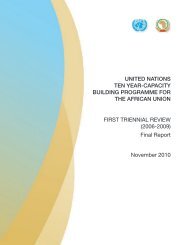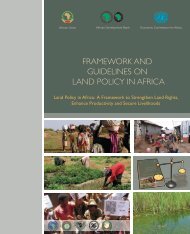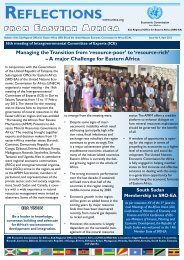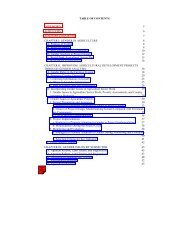A Decade of NEPAD - Economic Commission for Africa - uneca
A Decade of NEPAD - Economic Commission for Africa - uneca
A Decade of NEPAD - Economic Commission for Africa - uneca
Create successful ePaper yourself
Turn your PDF publications into a flip-book with our unique Google optimized e-Paper software.
people and their civil society organizations to participate<br />
in the institutional structures <strong>of</strong> the <strong>Africa</strong>n Union.<br />
In 2005, in furtherance <strong>of</strong> the ef<strong>for</strong>t to institutionalize<br />
CSO input into the infrastructure <strong>of</strong> the AU, an interim<br />
ECOSOCC structure was developed and ten Sectoral Committees<br />
were established to serve as the key operational<br />
mechanisms that would be used under ECOSOCC to develop<br />
opinions and provide contributions to the policy and<br />
programme development processes <strong>of</strong> the <strong>Africa</strong>n Union.<br />
The ten clusters were: political affairs, peace and security,<br />
infrastructure and energy, social affairs and health, human<br />
resources, science and technology, trade and industry, rural<br />
economy and agriculture, economic affairs, women and<br />
gender, and cross cutting programmes 78 .<br />
In 2007, elections were held in 23 countries to replace the<br />
interim structures and the <strong>for</strong>mal launch <strong>of</strong> the ECOSOCC<br />
General Assembly was held in Dar es Salaam, Tanzania on<br />
September 9, 2008. Today, 150 CSOs make up ECOSOCC.<br />
Two CSOs represent each AU member state. Ten CSOs<br />
operating regionally and eight operating continentally are<br />
also represented within ECOSOCC. A further 20 CSOs<br />
represent the various continents <strong>of</strong> the world where the<br />
<strong>Africa</strong>n Diaspora reside, and six ex-<strong>of</strong>ficio CSOs have been<br />
nominated by the AU <strong>Commission</strong> in consultation with<br />
Member States and serve based upon special considerations<br />
and criteria.<br />
The organizations that make up ECOSOCC’s membership<br />
represent women, youth, children, persons with disabilities,<br />
the elderly, associations <strong>of</strong> artists, engineers, health<br />
practitioners, social workers, media, teachers, legal pr<strong>of</strong>essionals,<br />
social scientists, academia and various business<br />
associations, sport associations, national chambers <strong>of</strong><br />
commerce, industry and agriculture as well as private<br />
se tor interest groups. Non-governmental organizations<br />
(NGOs), community based organizations (CBOs), voluntary<br />
organizations, cultural organizations and associations<br />
as well as social and pr<strong>of</strong>essional bodies from the Diaspora<br />
are also represented.<br />
The eight core functions that ECOSOCC was established<br />
to undertake are:<br />
78 The Role <strong>of</strong> the Private Sector and Civil Society: Review <strong>of</strong> <strong>NEPAD</strong><br />
After 8 years, UNECA, NRID, 2009 pp. 22-23<br />
5. <strong>NEPAD</strong> and the <strong>Africa</strong>n Civil Society Today A <strong>Decade</strong> <strong>of</strong> <strong>NEPAD</strong><br />
ӹ To contribute, through the provision <strong>of</strong> advice, to the effective<br />
translation <strong>of</strong> the objectives, principles and policies<br />
<strong>of</strong> the <strong>Africa</strong>n Union into concrete programmes, as<br />
well as to assist in the evaluation <strong>of</strong> these programmes;<br />
ӹ To undertake studies that are recommended or deemed<br />
necessary by other organs <strong>of</strong> the <strong>Africa</strong>n Union;<br />
ӹ To carry out other studies deemed necessary and submit<br />
recommendations as appropriate;<br />
ӹ To contribute to the promotion and popularization <strong>of</strong><br />
popular participation, best practice and expertise sharing,<br />
and the realization <strong>of</strong> the vision and objectives <strong>of</strong><br />
the <strong>Africa</strong>n Union;<br />
ӹ To contribute to the promotion <strong>of</strong> rule <strong>of</strong> law, human<br />
rights, good governance, democratic principles, children’s<br />
rights and gender equality;<br />
ӹ To promote and support the ef<strong>for</strong>ts <strong>of</strong> organizations engaged<br />
in the development <strong>of</strong> strategies and programmes<br />
related to <strong>Africa</strong>’s future development and to <strong>for</strong>ge<br />
pan-<strong>Africa</strong>n values that help enhance an <strong>Africa</strong>n social<br />
model and way <strong>of</strong> life;<br />
ӹ To foster and consolidate partnership between the <strong>Africa</strong>n<br />
Union and CSOs through effective public enlightenment,<br />
mobilization, and the provision <strong>of</strong> feedback on<br />
the activities <strong>of</strong> the Union; and<br />
ӹ To assume other roles and functions, and renders other<br />
tasks, as assigned or requested by the <strong>Africa</strong>n Union.<br />
In its early days <strong>of</strong> construct, ECOSOCC has been challenged<br />
by various funding and related operational constraints<br />
that have prevented it from fully fulfilling the<br />
significant mandate and charge that the organ has been<br />
given. Yet, the organ has significant promise and its establishment<br />
has been a significant step toward the evolution<br />
<strong>of</strong> the AU becoming a more people centred institution.<br />
Also, because <strong>of</strong> the inherent exclusivity <strong>of</strong> ECOSOCC<br />
relative to its constitutive act which requires representative<br />
election from member states, two additional outcomes <strong>of</strong><br />
the process <strong>of</strong> establishing ECOSOCC have been that: 1)<br />
a number <strong>of</strong> international CSO organizations that have<br />
been active in supporting <strong>Africa</strong>n development have not<br />
met the “<strong>Africa</strong>n or Diaspora CSO criteria” and have been<br />
excluded from representation within the body, and b) the<br />
relative weakness <strong>of</strong> national and regional CSO umbrella<br />
organs across <strong>Africa</strong> has meant that there are <strong>Africa</strong>n<br />
CSOs that did not participate in the national and regional<br />
63







